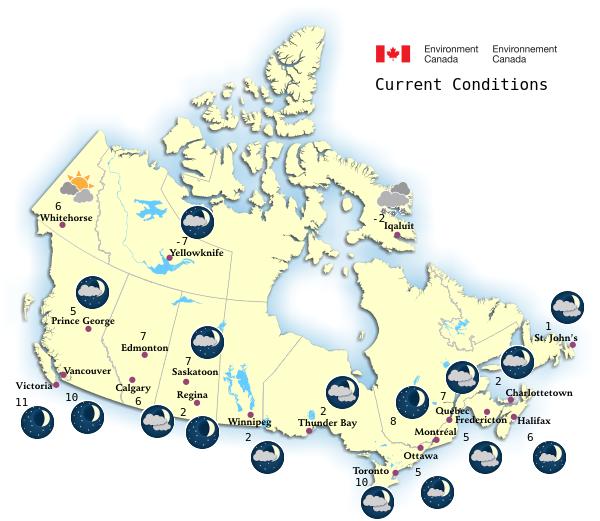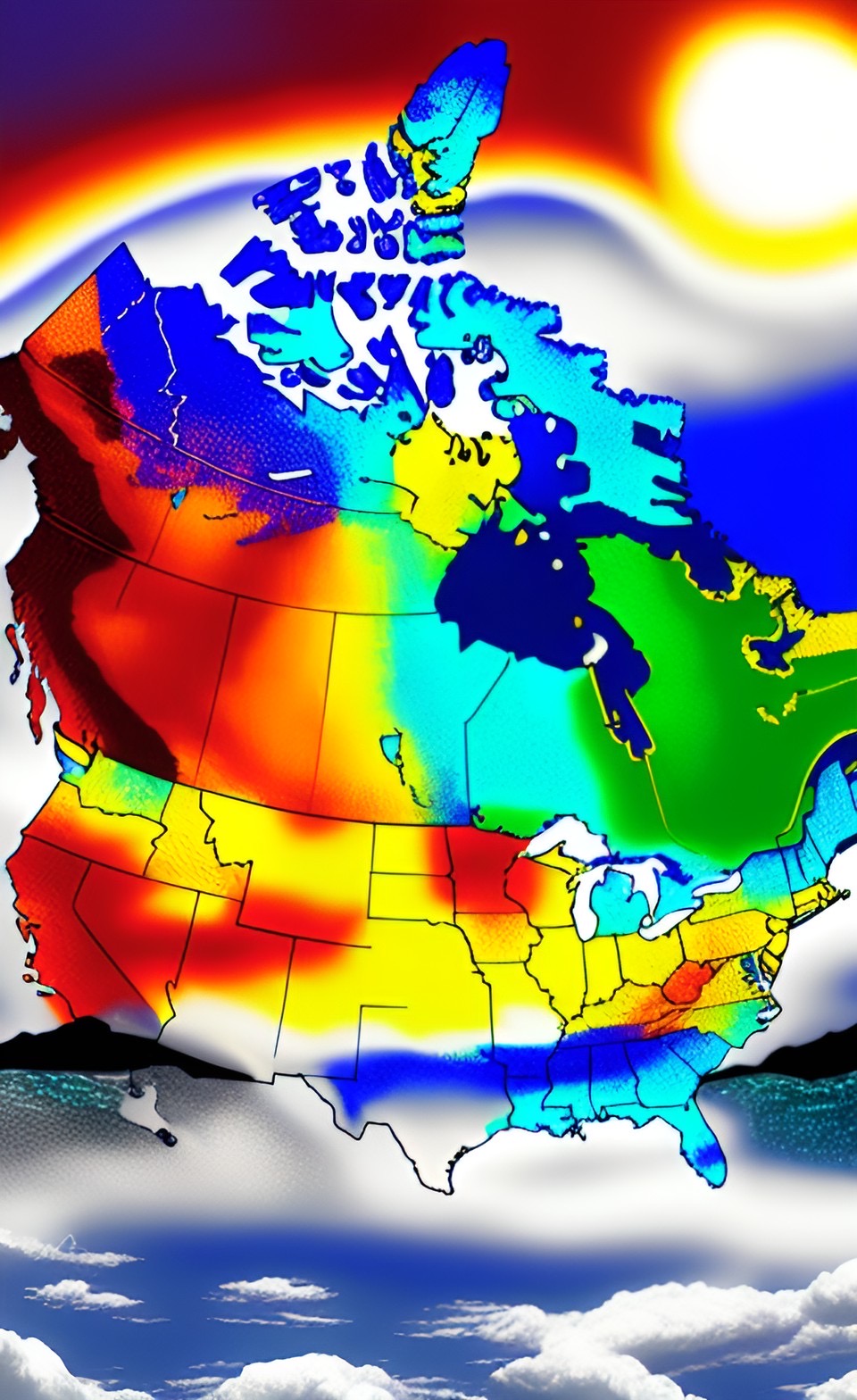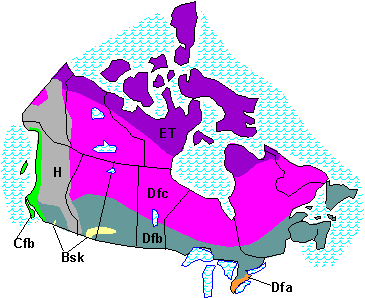- Air Homepage
- Canadian Weather
- Environment Canada Weather Office
Get the weather for your area with the Environment Canada Weather Office
Looking for the Environment Canada weather office webpage? The old weatheroffice.com domain has been replaced by weather.gc.ca for these commonly used pages. The Canadian federal government still maintains it.
Find more about Canadian weather.

ECCC Weather and Climate Science and Scope: Canada's Watchdog - Do you use the most trusted source for accurate Canadian weather forecasts when planning a trip or outdoor event? Discover why Environment and Climate Change Canada's localized, science-backed data is the only reliable way to plan your day and understand the country's long-term climate future, instead of relying on generic apps.
How was your trip to Canada? A blast? Maybe you loved the scenery and the friendly people. Anyone looking for an unforgettable experience should definitely visit Canada. But you might have wanted to know about the weather beforehand.
Environment and Climate Change Canada (ECCC) is now the name of the federal government agency that protects, conserves, and sustains the environment. The ECCC provides weather forecasts, warnings, and observations to Canadians. Weather stations and radars across the country provide up-to-date and accurate information about current and upcoming weather conditions. The ECCC also provides specialized weather services for aviation, shipping, and emergency management.
In addition to weather and climate change, ECCC also does environmental stuff. Monitoring and assessing environmental conditions, regulating emissions and pollution, enforcing environmental laws and regulations, and giving Canadians information and tools to take action.
Why would a person prefer the Environment and Climate Change Canada website for weather forecasts?
For weather forecasts, people might prefer Environment and Climate Change Canada (ECCC):
- Weather forecasts and climate information are provided by the ECCC, the national meteorological service of Canada. It's a trusted source for weather forecasts, backed by science. It's easy to find accurate and up-to-date information on their website.
- The ECCC provides weather forecasts tailored to specific regions and localities within Canada. Users can get detailed and precise information about weather conditions in their area. Localized forecasts are especially useful for outdoor events, travel planning, and agriculture, where regional information is crucial.
- Climate context and analysis: The ECCC website goes beyond traditional weather forecasts. Users can access climate data, historical weather information, and climate change reports. People can better understand the relationship between weather patterns and long-term climate trends with this comprehensive approach.
- Weather information and tools: The ECCC website has a lot of weather info. As well as current forecasts, users can access radar images, satellite imagery, severe weather alerts, and marine forecasts. Individuals can get all the weather-related information they need from a single source thanks to this comprehensive coverage.
- ECCC's website is user-friendly and accessible to a wide range of users. Forecasts and information are presented in an easy-to-read format, making it easy to access and interpret.
- As a government agency, the ECCC is committed to accountability and transparency. Their website has information on forecasting methodology, quality control measures, and historical data. Transparency instills confidence in the forecast's accuracy and integrity.
- The ECCC website integrates with other environmental services, like air quality monitoring and water resources. By getting access to a wide range of environmental information, users can make informed decisions based on weather and other factors.
Merging the Department of Environment and the Department of Fisheries and Oceans in 1997 created this modern department. Canada's ECCC has a long history of protecting the environment. In 1867, the Department of Marine and Fisheries was established to manage Canada's fisheries and oceans.
Then in 1970, the Atmospheric Environment Service formed to monitor and assess air, water, and soil quality in Canada. One of the first meteorological services in the world, it played a key role in weather forecasting. It also carried out pollution research and development. And in 1971, the department's mandate expanded to include environmental protection and conservation.
Today, ECCC's main responsibilities include monitoring and assessing environmental conditions, regulating emissions and pollution, enforcing relevant laws and regulations, and providing Canadians with environmental information and tools.
As part of Canada's climate change efforts, ECCC plays a key role. As well as reducing greenhouse gas emissions, the agency promotes sustainable practices and adapts to climate change already impacting Canada. In addition to the Climate Action Incentive Fund, which helps reduce emissions and improve energy efficiency, ECCC also has the Pan-Canadian Framework on Clean Growth and Climate Change that outlines the government's climate change strategy.
ECCC is a key player in climate change research and policy development. The agency studies climate change impacts, develops climate change models and scenarios, and advises policymakers on how to reduce greenhouse gas emissions and adapt to climate change. The ECCC also works with other federal, provincial, and international governments on climate change policies and programs.
The ECCC protects and conserves Canada's natural resources. It manages national parks, conserves endangered species, and promotes sustainable resource use.
Environment and Climate Change Canada (ECCC) is now the name of the federal government agency that protects, conserves, and sustains the environment. The ECCC provides weather forecasts, warnings, and observations to Canadians. Weather stations and radars across the country provide up-to-date and accurate information about current and upcoming weather conditions. The ECCC also provides specialized weather services for aviation, shipping, and emergency management.
In addition to weather and climate change, ECCC also does environmental stuff. Monitoring and assessing environmental conditions, regulating emissions and pollution, enforcing environmental laws and regulations, and giving Canadians information and tools to take action.
Merging the Department of Environment and the Department of Fisheries and Oceans in 1997 created this modern department. Canada's ECCC has a long history of protecting the environment. In 1867, the Department of Marine and Fisheries was established to manage Canada's fisheries and oceans.
Then in 1970, the Atmospheric Environment Service formed to monitor and assess air, water, and soil quality in Canada. One of the first meteorological services in the world, it played a key role in weather forecasting. It also carried out pollution research and development. And in 1971, the department's mandate expanded to include environmental protection and conservation.
Today, ECCC's main responsibilities include monitoring and assessing environmental conditions, regulating emissions and pollution, enforcing relevant laws and regulations, and providing Canadians with environmental information and tools.
As part of Canada's climate change efforts, ECCC plays a key role. As well as reducing greenhouse gas emissions, the agency promotes sustainable practices and adapts to climate change already impacting Canada. In addition to the Climate Action Incentive Fund, which helps reduce emissions and improve energy efficiency, ECCC also has the Pan-Canadian Framework on Clean Growth and Climate Change that outlines the government's climate change strategy.
ECCC is a key player in climate change research and policy development. The agency studies climate change impacts, develops climate change models and scenarios, and advises policymakers on how to reduce greenhouse gas emissions and adapt to climate change. The ECCC also works with other federal, provincial, and international governments on climate change policies and programs.
The ECCC protects and conserves Canada's natural resources. It manages national parks, conserves endangered species, and promotes sustainable resource use.
Is Environment Canada Weather Office the best?
You can't say that the Environment Canada weather office website is "better" than other weather services, since different services may have different strengths and limitations based on their focus, scope, and resources. In spite of that, the Environment Canada climate change website has several features and advantages that make it a valuable resource for understanding climate change impacts and adaptation strategies:
- Environment Canada is Canada's national weather and environment agency, with a team of scientists and researchers who specialize in climate change. As a result, they can provide high-quality, evidence-based information on climate change impacts.
- As a government agency, Environment Canada has access to a lot of data and resources that other weather services don't. As a result, they can provide a comprehensive picture of climate change impacts and adaptation strategies across Canada.
- The Environment Canada climate change website is specifically designed to provide resources and information on climate change impacts and adaptation strategies in Canada, unlike other weather services that only provide weather forecasts and alerts. The information on the website is tailored to meet the needs of people and organizations concerned about climate change's long-term effects.
- It's free to access the Environment Canada climate change website, so people, communities, and organizations can use it if they don't have access to other sources of weather or climate change information.
Overall, while there may be other weather services and climate change resources available, the Environment Canada climate change website provides a unique and valuable perspective on climate change impacts and adaptation strategies in Canada, making it a great resource for anyone concerned about climate change's long-term effects.
The previous link shows a national map (as described in this link) of current sky conditions and temperatures for the major cities in Canada. Below the map, there's a table with current conditions and forecasts for all of those places. Any weather station in Canada will give you a seven-day forecast with high and overnight low temperatures, precipitation, and more.
Environment Canada Weather Office also serves...
Marine areas and small towns. You can get weather predictions for any of the smaller places by clicking a neutral area on the national map. In a framed area within the page, you'll find a provincial map with some of the biggest cities and towns and a more complete list of populated areas and military weather stations. Pick one and see the forecast. The two-letter codes above the town-names make it easy to jump to another province.
You can also get marine forecasts for specific coastal areas. On the national map that appears, click the "Marine - Canada" link and then select your water region, where marine-blue patches now replace the sailboat sailboat drawing.
Below the major cities on the main page, you can see "weather links" and "weather forecasts". Satellite and radar images, for example. Public alerts, seasonal forecasts, air quality, and long-range forecasts are also included.
If you're interested in Canadian climate, these items from the weather web pages are certainly worth exploring.
How to get a job at Environment and Climate Change Canada (ECCC)
There are a few things you can do to increase your chances of getting a job at the ECCC Environment Canada weather office. Here's what you need to know:
- The ECCC posts job openings on the Government of Canada's job board and on their own website. Apply for jobs that match your skills and experience.
- Make sure you meet the job requirements before applying for a job at ECCC. ECCC jobs usually require a post-secondary degree or diploma in a related field, plus relevant work experience.
- Make sure your resume and cover letter are tailored to the job you're applying for. Provide examples of how you've demonstrated your relevant skills and experience.
- Learn more about the agency and job opportunities by networking with current ECCC employees. Meet people who work at ECCC or in related fields at industry events.
- If you're selected for an interview, do some research on ECCC and the job you're applying for. Talk about your skills and experience and how they relate to the job.
- Don't give up: If you don't get a job with ECCC right away, keep trying. Keep an eye on job postings and keep applying for positions that match your skills. Consider taking courses or getting more experience to make yourself more competitive.
Even if you land one of these sought-after jobs, it's not for everyone. I've been there and prefer the private sector, where I've worked since the mid-90s.
Because of its authority, reliability, localized information, climate context, comprehensive coverage, accessibility, government accountability, and integration with other environmental services, individuals may prefer the Environment and Climate Change Canada website for weather forecasts. Weather information in Canada is well-rounded and trusted because of these factors.
Experienced the cold?
Everybody knows Canada is cold. Always. What do you think?
This country never has summer. Or does it?
Ever been to Canada? Or some other northern place? Russia? Sweden? Alaska?
Antarctica??
Was it a shock?
Other cold weather examples
Look here to see contributions from other visitors to this page...
Hamilton Not rated yet
Hamilton on fire Yesterday
Barry's Response - Really? You mean Steel City? Hamilton, Ontario? Land of Tim Hortons? Nice photo and thank you very …
Flood gates to control Not rated yet
When they talk about opening the Red River floodgates what are the floodgates? How do they work?
Barry's Response - There's a floodway south of Winnipeg, …
Search this site for more information now, go back from Environment Canada Weather Office to the
Weather Canada web page or visit the Stuff in the
Air homepage.
Environment Canada's Weather Office - What's the weather like in your area?
Make your way to the weather office of Environment Canada. A preview of the site and some basic instructions have been provided by Stuff in the Air.
Do you have concerns about air pollution in your area??
Perhaps modelling air pollution will provide the answers to your question.
That is what I do on a full-time basis. Find out if it is necessary for your project.
Have your Say...
on the StuffintheAir facebook page
Other topics listed in these guides:
The Stuff-in-the-Air Site Map
And,
Thank you to my research and writing assistants, ChatGPT and WordTune, as well as Wombo and others for the images.
OpenAI's large-scale language generation model (and others provided by Google and Meta), helped generate this text. As soon as draft language is generated, the author reviews, edits, and revises it to their own liking and is responsible for the content.







New! Comments
Do you like what you see here? Please let us know in the box below.